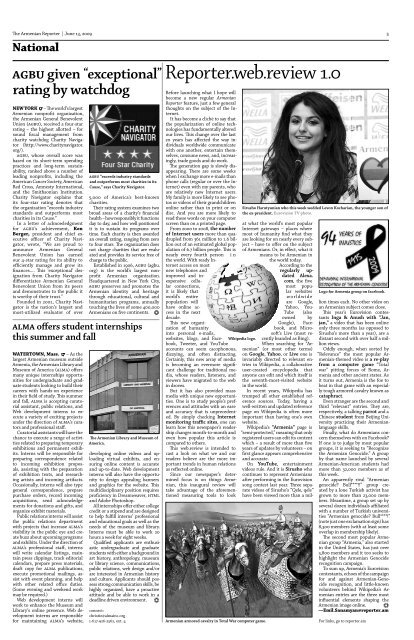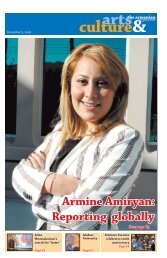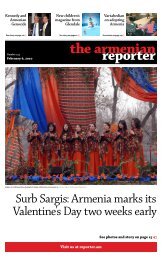Eastern U.S. edition - Armenian Reporter
Eastern U.S. edition - Armenian Reporter
Eastern U.S. edition - Armenian Reporter
Create successful ePaper yourself
Turn your PDF publications into a flip-book with our unique Google optimized e-Paper software.
The <strong>Armenian</strong> <strong>Reporter</strong> | June 13, 2009 5<br />
National<br />
agbu given “exceptional”<br />
rating by watchdog<br />
NEW YORK – The world’s largest<br />
<strong>Armenian</strong> nonprofit organization,<br />
the <strong>Armenian</strong> General Benevolent<br />
Union (agbu), received a four-star<br />
rating – the highest allotted – for<br />
sound fiscal management from<br />
charity watchdog Charity Navigator<br />
(http://www.charitynavigator.<br />
org/).<br />
agbu, whose overall score was<br />
based on its short-term spending<br />
practices and long-term sustainability,<br />
ranked above a number of<br />
leading nonprofits, including the<br />
American Cancer Society, American<br />
Red Cross, Amnesty International,<br />
and the Smithsonian Institution.<br />
Charity Navigator explains that<br />
its four-star rating denotes that<br />
the organization “exceeds industry<br />
standards and outperforms most<br />
charities in its Cause.”<br />
In a letter of acknowledgment<br />
for agbu’s achievement, Ken<br />
Berger, president and chief executive<br />
officer of Charity Navigator,<br />
wrote, “We are proud to<br />
announce <strong>Armenian</strong> General<br />
Benevolent Union has earned<br />
our 4-star rating for its ability to<br />
efficiently manage and grow its<br />
finances.... This ‘exceptional’ designation<br />
from Charity Navigator<br />
differentiates <strong>Armenian</strong> General<br />
Benevolent Union from its peers<br />
and demonstrates to the public it<br />
is worthy of their trust.”<br />
Founded in 2001, Charity Navigator<br />
is the nation’s largest and<br />
most-utilized evaluator of over<br />
agbu “exceeds industry standards<br />
and outperforms most charities in its<br />
Cause,” says Charity Navigator.<br />
5,000 of America’s best-known<br />
charities.<br />
Their rating system examines two<br />
broad areas of a charity’s financial<br />
health – how responsibly it functions<br />
day to day, and how well positioned<br />
it is to sustain its programs over<br />
time. Each charity is then awarded<br />
an overall rating, ranging from zero<br />
to four stars. The organization does<br />
not charge charities that are evaluated<br />
and provides its service free of<br />
charge to the public.<br />
Established in 1906, agbu (agbu.<br />
org) is the world’s largest nonprofit<br />
<strong>Armenian</strong> organization.<br />
Headquartered in New York City,<br />
agbu preserves and promotes the<br />
<strong>Armenian</strong> identity and heritage<br />
through educational, cultural and<br />
humanitarian programs, annually<br />
touching the lives of some 400,000<br />
<strong>Armenian</strong>s on five continents. <br />
alma offers student internships<br />
this summer and fall<br />
WATERTOWN, Mass. – As the<br />
largest <strong>Armenian</strong> museum outside<br />
Armenia, the <strong>Armenian</strong> Library and<br />
Museum of America (alma) offers<br />
many unique internships opportunities<br />
for undergraduate and graduate<br />
students looking to build their<br />
careers with hands-on experience<br />
in their field of study. This summer<br />
and fall, alma is accepting curatorial<br />
assistant, public relations, and<br />
Web development interns to execute<br />
a variety of exciting projects<br />
under the direction of alma’s curators<br />
and professional staff.<br />
Curatorial assistants will have the<br />
chance to execute a range of activities<br />
related to preparing temporary<br />
exhibitions and permanent exhibits.<br />
Interns will be responsible for<br />
preparing correspondence related<br />
to incoming exhibition proposals,<br />
assisting with the preparation<br />
of exhibition texts, and researching<br />
artists and incoming artifacts.<br />
Occasionally, interns will also type<br />
general correspondence, prepare<br />
purchase orders, record incoming<br />
acquisitions, send acknowledgements<br />
for donations and gifts, and<br />
organize exhibit materials.<br />
Public relations interns will assist<br />
the public relations department<br />
with projects that increase alma’s<br />
visibility in the public eye and create<br />
buzz about upcoming programs<br />
and exhibits. Under the direction of<br />
alma’s professional staff, interns<br />
will write calendar listings, maintain<br />
press clippings, track editorial<br />
calendars, prepare press materials,<br />
draft copy for alma publications,<br />
execute promotional mailings, assist<br />
with event planning, and help<br />
with other related office duties.<br />
(Some evening and weekend work<br />
may be required.)<br />
Web development interns will<br />
work to enhance the Museum and<br />
Library’s online presence. Web development<br />
interns are responsible<br />
for maintaining alma’s website,<br />
The <strong>Armenian</strong> Library and Museum of<br />
America.<br />
developing online videos and uploading<br />
virtual exhibits, and ensuring<br />
online content is accurate<br />
and up-to-date. Web development<br />
interns will also have the opportunity<br />
to design appealing banners<br />
and graphics for the website. This<br />
multidisciplinary position requires<br />
proficiency in Dreamweaver, html<br />
and Adobe Photoshop.<br />
All internships offer either college<br />
credit or a stipend and are designed<br />
to help fulfill interns’ professional<br />
and educational goals as well as the<br />
needs of the museum and library.<br />
Interns must be able to work 20<br />
hours a week for eight weeks.<br />
Qualified applicants are enthusiastic<br />
undergraduate and graduate<br />
students with either a background in<br />
art history, anthropology, museum<br />
or library science, communications,<br />
public relations, web design and/or<br />
are interested in <strong>Armenian</strong> history<br />
and culture. Applicants should possess<br />
strong communication skills, be<br />
highly organized, have a proactive<br />
attitude and be able to work in a<br />
deadline driven environment. <br />
connect:<br />
christie@almainc.org<br />
1-617-926-2562, ext. 4<br />
<strong>Reporter</strong>.web.review 1.0<br />
Before launching what I hope will<br />
become a new regular <strong>Armenian</strong><br />
<strong>Reporter</strong> feature, just a few general<br />
thoughts on the subject of the Internet.<br />
It has become a cliché to say that<br />
the popularization of online technologies<br />
has fundamentally altered<br />
our lives. This change over the last<br />
20 years has affected the way individuals<br />
worldwide communicate<br />
with one another, entertain themselves,<br />
consume news, and, increasingly,<br />
trade goods and do work.<br />
The generation gap is slowly disappearing.<br />
There are some weeks<br />
when I exchange more e-mails than<br />
phone calls (regular or over the Internet)<br />
even with my parents, who<br />
are relatively new Internet users.<br />
My family is more likely to see photos<br />
or videos of their grandchildren<br />
online rather than in print or on<br />
disc. And you are more likely to<br />
read these words on your computer<br />
screen than on a printed page.<br />
From 2000 to 2008, the number<br />
of Internet users more than quadrupled<br />
from 361 million to 1.6 billion<br />
out of an estimated global population<br />
of 6.7 billion people. This is<br />
nearly every fourth person<br />
the world. With ready Internet<br />
access on most<br />
new telephones and<br />
improved and in-<br />
i n<br />
expensive cellular<br />
connections,<br />
it is likely that<br />
world’s entire<br />
population will<br />
have online access<br />
in the next<br />
decade.<br />
This new organization<br />
of humanity<br />
into personal e-mails,<br />
websites, blogs, and Facebook,<br />
Tweeter, and YouTube<br />
accounts can seem cacophonous,<br />
dizzying, and often distracting.<br />
Certainly, this new array of media<br />
is becoming an evermore significant<br />
challenge for traditional media,<br />
whose readers, listeners, and<br />
viewers have migrated to the web<br />
in droves.<br />
But it has also provided mass<br />
media with unique new opportunities.<br />
One is to study people’s preferences<br />
and attitudes with an ease<br />
and accuracy that is unprecedented.<br />
By simply checking Internet<br />
monitoring traffic sites, one can<br />
learn how this newspaper’s readership<br />
changes month-to-month and<br />
even how popular this article is<br />
compared to others.<br />
This web.review is intended to<br />
cast a look on what we and our<br />
readers believe are the more important<br />
trends in human relations<br />
as reflected online.<br />
Since our newspaper’s determined<br />
focus is on things <strong>Armenian</strong>,<br />
this inaugural review will<br />
take advantage of the aforementioned<br />
measuring tools to look<br />
<strong>Armenian</strong> armored cavalry in Total War computer game.<br />
Sirusho Harutyunian who this week wedded Levon Kocharian, the younger son of<br />
the ex-president. Eurovision TV photo.<br />
at what the world’s most popular<br />
Internet gateways – places where<br />
most of humanity find what they<br />
are looking for on nearly every subject<br />
– have to offer on the subject<br />
of <strong>Armenian</strong>s. Or, in effect, what it<br />
means to be <strong>Armenian</strong> in<br />
the world today.<br />
According to the<br />
regularly updated<br />
Alexa.<br />
com, the five<br />
most popular<br />
websites<br />
worldwide<br />
are Google,<br />
Yahoo, You-<br />
Tube (also<br />
owned by<br />
Wikipedia logo.<br />
Logo for Armenia group on facebook.<br />
Google), Facebook,<br />
and Microsoft’s<br />
Live (most recently<br />
branded as Bing).<br />
When searching for “<strong>Armenian</strong>”<br />
(or most other terms)<br />
on Google, Yahoo, or Live one is<br />
invariably directed to relevant entries<br />
in Wikipedia, a collaborative<br />
user-created encyclopedia that<br />
anyone can edit and which itself is<br />
the seventh-most-visited website<br />
in the world.<br />
In recent years, Wikipedia has<br />
trumped all other established reference<br />
sources. Today, having a<br />
well-written and updated reference<br />
page on Wikipedia is often more<br />
important than having one’s own<br />
website.<br />
Wikipedia’s “Armenia” page is<br />
“semi-protected,” meaning that only<br />
registered users can edit its content<br />
which – a result of more than five<br />
years of updates by volunteers – on<br />
first glance appears comprehensive<br />
and accurate.<br />
On YouTube, entertainment<br />
videos rule. And it is Sirusho who<br />
continues to represent <strong>Armenian</strong>s<br />
after performing in the Eurovision<br />
song contest last year. Three separate<br />
videos of Sirusho’s “Qele, qele”<br />
have been viewed more than a million<br />
times each. No other video on<br />
an <strong>Armenian</strong> subject comes close.<br />
This year’s Eurovision contestants<br />
Inga & Anush with “Jan,<br />
jan,” a video that has been online<br />
only three months (as opposed to<br />
Sirusho’s more than a year), are a<br />
distant second with over half a million<br />
views.<br />
Oddly enough, when sorted by<br />
“Relevance” the most popular <strong>Armenian</strong>-themed<br />
video is a re-play<br />
from a computer game “Total<br />
war” pitting forces of Rome, Armenia<br />
and other ancient states. As<br />
it turns out, Armenia is the foe to<br />
beat in that game with an especially<br />
tough armored cavalry known as<br />
cataphract.<br />
Even stranger are the second and<br />
third “relevant” entries. They are,<br />
respectively, a talking parrot and a<br />
Chinese student from Beijing University<br />
practicing their <strong>Armenian</strong>language<br />
skills.<br />
Finally, what do <strong>Armenian</strong>s concern<br />
themselves with on Facebook?<br />
If one is to judge by most popular<br />
groups, it is seeking to “Recognize<br />
the <strong>Armenian</strong> Genocide.” A group<br />
by that name launched by several<br />
<strong>Armenian</strong>-American students had<br />
more than 32,000 members as of<br />
this week.<br />
An apparently rival “<strong>Armenian</strong><br />
genocide? Bull****!!” group created<br />
by a lone Turkish activist has<br />
grown to more than 23,000 members.<br />
Meantime, a group set up by<br />
several dozen individuals affiliated<br />
with a number of Turkish universities<br />
“<strong>Armenian</strong> genocide? Bull****!”<br />
(note just one exclamation sign) has<br />
8,300 members (with at least some<br />
overlap in membership likely).<br />
The second most popular <strong>Armenian</strong><br />
group “Armenia,” also started<br />
in the United States, has just over<br />
3,800 members and it too seeks to<br />
highlight the <strong>Armenian</strong> Genocide<br />
recognition campaign.<br />
To sum up, Armenia’s Eurovision<br />
contestants, echoes of the campaign<br />
for and against <strong>Armenian</strong>-Genocide<br />
recognition, and little-known<br />
volunteers behind Wikipedia’s <strong>Armenian</strong><br />
entries are the three most<br />
influential elements shaping the<br />
<strong>Armenian</strong> image online. <br />
—Emil.Sanamyan@reporter.am<br />
For links, go to reporter.am

















